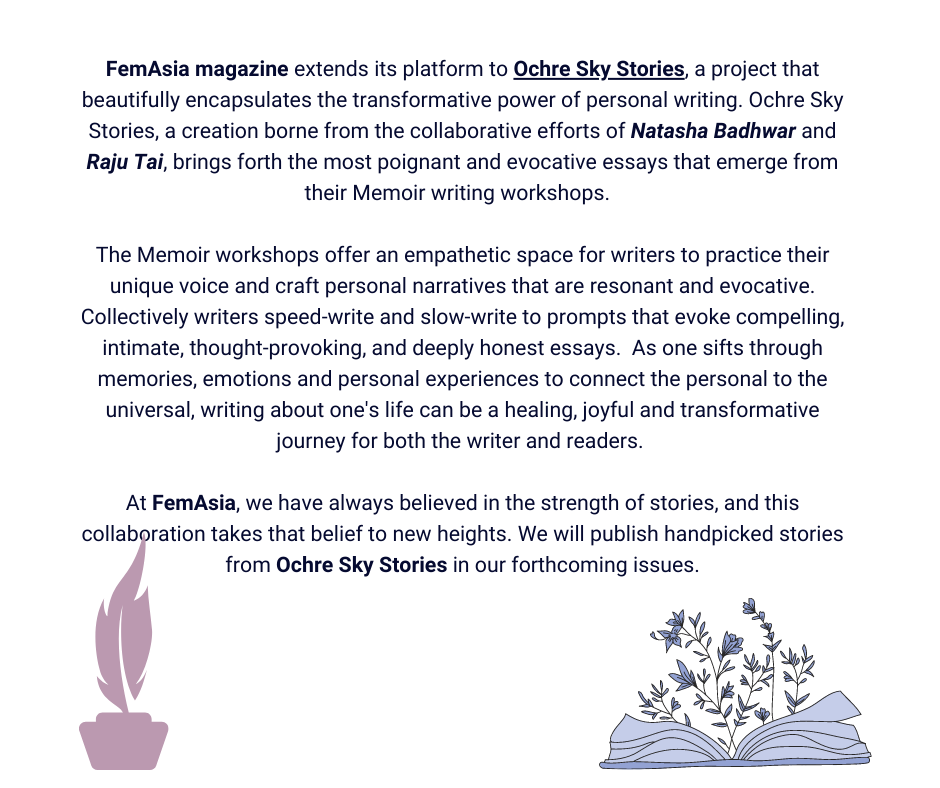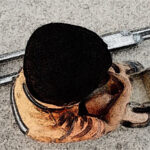The sofa smelled like toast. My head had been forced into its corner. The upholstery was frayed in this part, and I could see a tiny brown piece of bread tucked into a crevice in the cushion. This would be the work of any one of my pre-teen cousins. The rascals regularly hid food in furniture corners and fooled their mothers, who believed they were raising good, no-fuss, breakfast-eating sons.
By now the hand on my neck had begun shoving my head deeper into the sofa, with greater force. I started gasping for breath. I could hear screams behind me. My aunts were trying to get the hand off my neck. I was beginning to feel the force of their body on mine.
Suddenly, the hand let go. I moved my face up to catch some air. As I turned, the hand started raining blows on me. The voice to whom the hand belonged shouted at me. “I will finish you off. You will have no identity.”
An hour before my face got shoved into the sofa, I had been shown the photograph of a good 22-year-old boy from Kanpur. He was the sort who would eat his breakfast without a fuss. He had been selected as my suitor. Talks between families had progressed. In all probability, I was going to land up as his wife.
I Was Prepared For This
Here, finally, was my Bollywood moment. I had prepped for it, for more than ten years, from the day my father died and I became the girl with the ‘late father’ who would find her family in the home of her husband.
This was supposed to be my breakthrough moment. But it felt like the opposite. I was shivering. I had lost my tongue. I pulled together every frightened muscle in my body to stand firm and straight. I looked straight into the eyes of the person who would soon have his hand on my neck. “I am not getting married to this boy or to anyone else,” I squeaked. “I will live my own life, I will be my own identity.”
The blows began to rain on me, even before I had completed my declaration of freedom.
Girls and boys in our large joint family did not talk like this, though they may have wanted to.
Back in the 1960s, two talented uncles of mine had set up their own music band. They did Mohammad Rafi and Kishore Kumar covers. They performed at family functions because public performances were taboo. I remember the black-and-white photographs of these handsome men in flared bell bottoms, and broad sideburns, with their guitar, drums, and harmonica.
According to family lore, just when the brothers had started to taste freedom in their music, they were told to shut shop. The order was clear – Dump your band-baaja hobby. You can forget about your cash inflow if you do not focus only on the family business. My uncles had given away their guitars and drums to avoid getting that hand on their necks.
Why Did No One Intervene?
Cut back to the day when my head got shoved into the sofa. After the hand went on an overdrive with slaps and punches, it grabbed my head and banged it on the wall. I had imagined this scene in my mind since the year I stepped into college. College was the danger zone – the runway from where I would take off either for the heaven of freedom, or the hell of a forced marriage.
On that day, I followed my rehearsed script despite the violence. No resistance, no crying, no shouting. “Do what you will. I will live my own life.”
The venue of this drama was a large, airy, sunlit balcony on the first floor of our home. The balcony was the heartbeat of our home. It was the landing place where the Gupta people became a family.
On regular days, the 15+ residents of our home would emerge from various rooms and converge on this spot. They would have morning tea, pass around newspapers, chat up a bit, and then head to their places of duty. They would meet in the balcony again in the evening for snacks and television, before retiring back to their rooms for the day. On cricket match days, our beloved neighbours would join us in the balcony for that stadium vibe.
That afternoon in May, when my head got shoved in the sofa, my uncles were away at work. My grandmother stood in one corner of the balcony, watching me get pummelled. She was on my side. But the hand would have thwacked her if she had stepped in. So she did not. My two aunts were closer to me, close to the large TV set. They were sometimes screaming, sometimes intervening, as if on a see-saw, going up with indignation at my behaviour, going down with horror at the hand bashing me up.
My mother had locked herself in the puja room on the mezzanine floor. She was certain that her prayers would be of more use than her presence in the balcony. My brothers and a dozen cousins on summer break had retreated to the large ‘party’ hall on the ground floor. As bombs dropped above, they were holding each other in the bunkers below.
Locked Up for 3 Months
This was the summer when I was locked up in my room for 3 months. A fresh graduate, I was 20, going on 21. I had graduated. My friends were stepping into their first jobs. I was not going to let prison hold me back.
I put myself on a self-designed internship. My job was to read and make up my mind, even more. Books were allowed in my home prison. I read all the books on political and feminist philosophy that I had bought for my undergraduate course, but had just not been able to read in college.
“Where will you go, if you get thrown out of home? How will you feed yourself? No girl in any generation of our family has crossed these boundaries. How will you survive? Do you have any plans?” My mom would worry herself sick with these questions when she came to give me food.
Thing is, I knew. I had a plan. I had a set of wild feminist friends, who regularly opened up their homes for internally-displaced refugees like me. I had worked and saved money through freelance journalism. Through it all, I had kept it real.
My atlas of freedom had very regular destinations. Get out of prison. Get a job. Rent a room. Live alone. Cook, clean, and dust. Make ends meet. Find love, maybe. These were routine milestones for my friends, who came from families where the revolution had been expressed a generation earlier.
For me, every dot on the map was a milestone of untrammelled personhood.
In the months that I was locked up in my room, I would read a lot. I would browse through a book of Georgia O’Keefe’s paintings that I had purchased a few months earlier from the Calcutta Book Fair.
3 months after the incident, the hand on my neck turned the knob of my prison door, and grudgingly let me out into the open world.
This did not happen overnight. My friends colluded with our teachers who connected with others who were allies in our family business. Everyone worked to kick off an underground campaign to free me. Eventually, the hand on my neck was the hand that led me into my world of work, where I shaped my life and identity.
The Summer of my Freedom
That summer I learned that courage is a job that you go to every day. It’s a workplace where you are not alone. You find colleagues, allies and champions, who you hang out with in your office balconies, who you bump into at tea-break during workshops, who you meet during fieldwork, in the cool shade of trees in the corners of lush farms, while taking notes and listening to women from different worlds speak of their own roadmaps of freedom.
The hands on my neck were the hands of my grandfather. Two summers ago, he died from COVID-19. No one from his large family could be at his funeral. In his online memorial, I got a message from his friend in the zoom chat box, saying that he had died as a proud grandfather of a very stubborn granddaughter. I would have loved to hear that from my grandfather himself.
“Finally, your Dadaji has met his match,” my grandmother would sometimes say to me in my college years. She was always on my side.
……………..

More information about the Ochre Sky Memoir writing workshops is available here: Ochre Sky Memoir writing workshops
Read this essay on Ochre Sky Stories: The Summer of my Freedom



